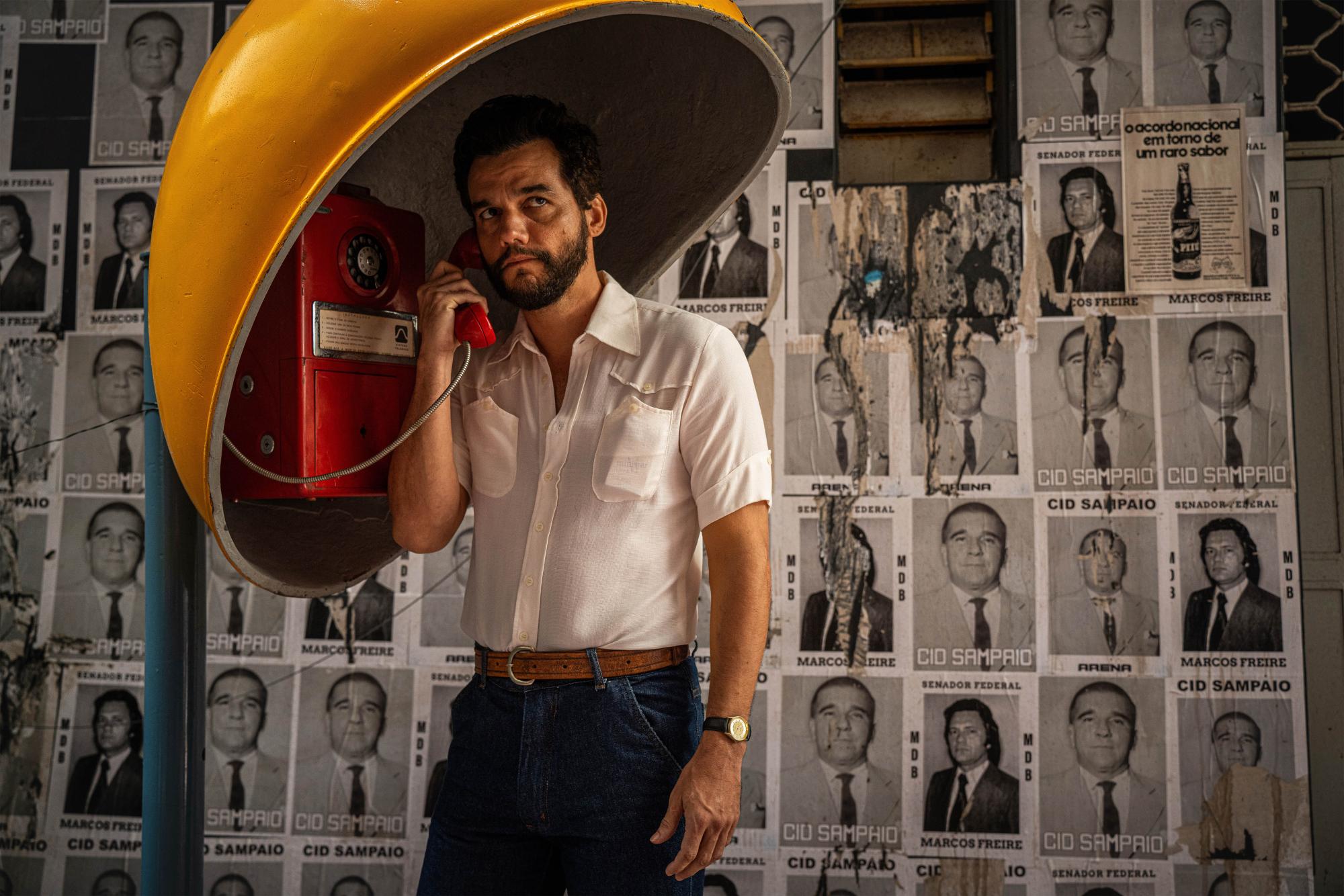
Kleber Mendonça Filho’s textured and suspenseful The Secret Agent brings us into the lawless and venal world of crooked Brazilian cops and their victims.
Brazil, 1977. It’s Carnaval; near-anarchy reigns and the death roll has risen to nearly a hundred. Kleber Mendonça Filho’s The Secret Agent is set against this backdrop, in a time of what it describes at the start as ‘great mischief’. Full of vivid bursts of primary colour and a vintage-honeyed depiction of the filmmaker’s hometown of Recife and environs, this film is mosaic of oppressed and violent humanity, depicting a period when the Brazilian version of a ‘witness protection programme’ was needed in order to protect citizens from Brazil itself.
Enter Marcel: the opening scene sees Wagner Moura pulling his yellow Beetle into a windswept, rural petrol station, only to notice a rotting corpse under wraps nearby, swarming with flies. The station attendant shrugs it off, describing that the night watchman shot and killed the robber almost a week ago. The police—ineffective, corrupt, and distracted by Carnaval—still haven’t bothered to turn up. And then: lo and behold, they arrive as our bemused protagonist is filling up his tank. But it turns out they’ve come to chase bribes, not to attend to the stinking body nearby. Filmed from the sparse middle distance or in overhead shots, the scene feels staged like a neo-Western. It’s with this intro that we are brought into the lawless and venal world of crooked Brazilian cops and their victims.
There were often terrifying punishments that awaited any soul defiant or unlucky enough to raise their ire during the era of the fascist military dictatorship. Our protagonist—whose real name, we eventually learn, is Armando—is a widower and political refugee who has done just that. His research department was targeted by a crooked industrialist who wanted to shut their work down. That industrialist has now put out a death threat on Armando, hiring a pair of vicious hitmen, playfully recalling hitmen of movies past, to do the job.
Rugged but circumspect, Moura is smoulderingly good as Armando, a mild-mannered academic hardened by loss and injustice and desperate to protect himself and his young son Fernando. Along with a fake name, he’s given a job in an ID office where he tries to keep his head down, but is almost instantly noticed by the gangster chief of police (Roberio Diogenes), a blowhard bully with a gaggle of cronies across the region. Meanwhile, elsewhere in Brazil, a human leg is discovered in the stomach of a dead shark. It hits the news with sensationalist force, especially in the year of Jaws. The owner of the leg appears to have been murdered and dumped in the sea. As a quite literally rancid representation of the brutality of this era, it’s a perfect motif.
The Secret Agent is also a knowingly vexing viewing experience—it reveals just how well Filho can construct a suspenseful, violent crime sequence, or a beautifully textured house party gathering, before upending our expectations entirely by pulling back at a pivotal juncture.
But just when you think you have a handle on this masterful, unfurling piece of multi-threaded storytelling, Filho flips a switch. This ambitiously-made tapestry of Brazilian lives, the cigarettes they smoke and the office snacks they eat, is actually being filtered through an archive project in the present day. A young woman, Flavia (Laura Lufesi) is listening through a series of tape recordings of interviews with all the major players for a university research endeavour.This framing device is clever without being too cute; it allows us to understand the enormity of the events unfolding with the benefit of historical hindsight.
The Secret Agent is also a knowingly vexing viewing experience—it reveals just how well Filho can construct a suspenseful, violent crime sequence, or a beautifully textured house party gathering, before upending our expectations entirely by pulling back at a pivotal juncture. The major end point of the narrative is revealed to us not in full-colour flashback but as a minor news item discovered retrospectively by the researcher Flavia; it’s an upbraiding of traditional narrative satisfaction, an empty spot in the story left to our imaginations. That makes it a potent stand-in for Armando’s story as so many Brazilians of that generation’s story. We are forced to piece together the lost details of those lives as an audience, and to remember them the best we can.





